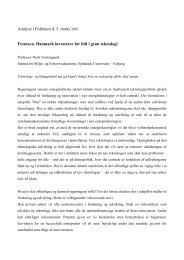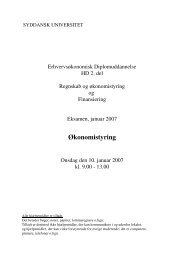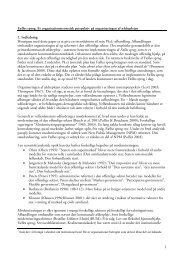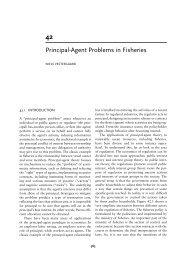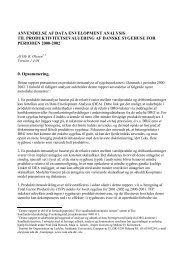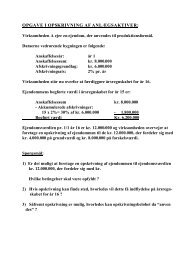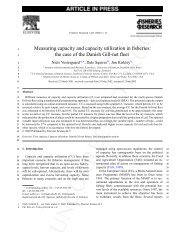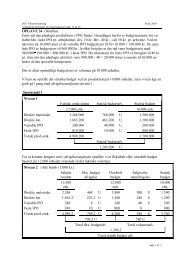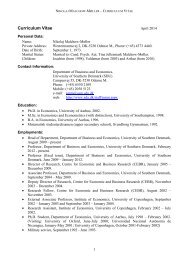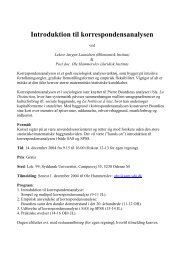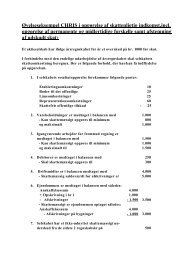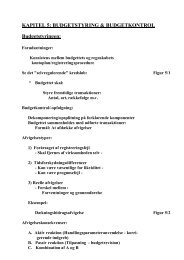Has the Left any freedom <strong>of</strong> manoeuvre at all <strong>in</strong> the economic <strong>and</strong> social policy tak<strong>in</strong>g <strong>in</strong>consideration the ongo<strong>in</strong>g globalization <strong>and</strong>, not to forget, the adaptation to the European Union? 89The pr<strong>in</strong>cipial idea to create more unity on the Left was accepted by SLD. In 1993 SLD itself hadpresented the idea, <strong>in</strong>vit<strong>in</strong>g all important left parties <strong>and</strong> groups to a “big debate” about alternativesto the economic policy followed by the post-Solidarity governments. In addition, important for SLDwas to obta<strong>in</strong> the greatest as possible support for Aleks<strong>and</strong>er Kwasniewski as president. Morecooperation among the different parties <strong>and</strong> groups on the Left might be helpful <strong>in</strong> order to achievethat goal.However, the plans about the formation <strong>of</strong> one s<strong>in</strong>gle united Left platform could not be realized 90 .Instead Leszek Miller spoke about the need to establish an “opposition forum” (“ForumOpozycyjne”) that - with SLD as the lead<strong>in</strong>g force – would be able to unify the different parties <strong>and</strong>groups <strong>in</strong> opposition to Jerzy Buzek’s government 91 . The discussions about more unity on the Leftwere not most important for SLD. Under all circumstances SLD rema<strong>in</strong>ed the most important s<strong>in</strong>glealmost hegemonic party on the Left. Thus, ma<strong>in</strong>ly for tactical reasons SLD took part <strong>in</strong> the “roundtable discussions” as UP might be decisive <strong>in</strong> the negotiations about construct<strong>in</strong>g <strong>of</strong> a new left w<strong>in</strong>ggovernment. Only few meet<strong>in</strong>gs among the left parties took place, but the political rapprochementbetween SLD <strong>and</strong> the Works Union (UP) was deepened <strong>and</strong> result<strong>in</strong>g <strong>in</strong> an agreement about closecooperation at the 2001 election with common c<strong>and</strong>idate lists <strong>and</strong> a common political programme.Important was not to repeat the mistakes <strong>of</strong> the former left w<strong>in</strong>g government from 1993 to 1997.Evidence from SLD-PSL-government 1993-1997 suggest that a government led by SLD difficultiesmight come up when tak<strong>in</strong>g controversial but important policy decisions, e.g. concern<strong>in</strong>g newpension schemes <strong>and</strong> reforms <strong>of</strong> the health sector. Under the previous SLD-PSL government alsoplans for adm<strong>in</strong>istrative reforms had circulated, but the f<strong>in</strong>al decisions were never taken. The AWSled government took those controversial decisions, which were left over from the formergovernment, but it did not pay sufficient attention to the quality <strong>of</strong> the law mak<strong>in</strong>g process <strong>and</strong> lawimplementation.The prospect <strong>of</strong> formation <strong>of</strong> a new centre-left government was facilitated by cooperation betweenSLD, UP <strong>and</strong> PSL at the local elections <strong>in</strong> 1998. After that election 9 <strong>of</strong> the 16 voivods were led bySLD, <strong>and</strong> 135 <strong>of</strong> the 235 powiatys had a mayor from SLD. In spite <strong>of</strong> favourable election polls SLDdid not show <strong>in</strong>terest <strong>in</strong> a new parliamentary election before 2000 presidential election. The policy<strong>of</strong> the Buzek government was heavily criticized, but SLD distanced itself from strikes <strong>and</strong> protestdemonstrations organized by OPZZ <strong>and</strong> “Samoobrona”. At the 2001 election SLD-UP failed toobta<strong>in</strong> a majority <strong>in</strong> the Sejm alone, but SLD became the “hegemonic” party <strong>in</strong> the new coalitiongovernment. Furthermore, it had the control over the Senate, <strong>and</strong> close close l<strong>in</strong>ks to the president(Kwasniewski). Like <strong>in</strong> 1993, SLD was forced to cooperate with the <strong>in</strong>ternally divided PolishPeasants’ <strong>Party</strong> (PSL), which after the 2001 election came under heavy fire from the populist“Selfdefence” (Samoobrona).At the 2001 election SLD was <strong>in</strong> the position to make pr<strong>of</strong>it from the AWS-UW government’mistakes implement<strong>in</strong>g <strong>of</strong> the four big reforms, especially the health reform. Therefore, one <strong>of</strong> theslogans under the SLD 2001 election campaign sounded: “We (i.e. SLD) can do it (i.e. the same)89 Mentioned e.g. <strong>in</strong> Dom<strong>in</strong>ika Wielowieyska, ”Przez morze czerwone”, Gazeta Wyborcza, 9.3., 1999:16-17.90 About those plans, se also Eliza Olczyk, ”Socialdemokratyczna wydmuszka”, Rzeczpospolita 27.-28 March, 1999:3.91 Mariusz Janicki, ”Wylacznosc na lewice”, Polityka, no. 16 (2189), 17 April, 1999:26-28.96
etter”. That election slogan was clearly less radical than the slogan from 1993, “It can not go on <strong>in</strong>that way”.Thus, <strong>in</strong> 2000 <strong>and</strong> 2001 the prospects for the future seemed to be bright. In 2001 more than half <strong>of</strong>the municipalities <strong>and</strong> regions were led by SLD or SLD-led coalitions. A “historical compromise”between SLD <strong>and</strong> Freedom Union (UW) seemed unrealistic, but, as we have seen, some “defectors”from UW took the decision to jo<strong>in</strong> the SLD. At the New Year 2000-2001 the majority <strong>of</strong> the Polishpeople considered SLD as a relevant party, to use Sartoris term, <strong>and</strong> a party ready to take overgovernmental responsibilities. All that signified that the past was no longer a barrier for theformation <strong>of</strong> a new centre-left government <strong>and</strong> a “post-communist” as president, but themacroeconomic problems were <strong>in</strong>creas<strong>in</strong>g <strong>and</strong> the room <strong>of</strong> maneuvres <strong>in</strong> the economic policyrema<strong>in</strong>ed low.At the turn <strong>of</strong> the century SLD had emerged as Pol<strong>and</strong>’s strongest political party with a pr<strong>of</strong>essionalcatch-all pr<strong>of</strong>ile. The party could lean on an extensive pr<strong>of</strong>essionalism <strong>and</strong> political experience <strong>and</strong>an ability <strong>of</strong> strategic plann<strong>in</strong>g. SLD’s c<strong>and</strong>idate Aleks<strong>and</strong>er Kwasniewski had been re-elected atthe 2000 presidential election. SLD was no longer a party consist<strong>in</strong>g <strong>of</strong> just veterans from thecommunist era, just opposite, it had liberated itself from extreme political groups such as“Proletaryat” <strong>and</strong> “PPS Ikonowicza”. SLD could also pr<strong>of</strong>it from the existence <strong>of</strong> a “hard core” <strong>of</strong>activists <strong>and</strong> supporters <strong>and</strong> personal networks (Miller, 1999:167-168). Before the 2001 election thepolitical pr<strong>of</strong>ile had become technocratic <strong>and</strong> pragmatic. SLD behaved <strong>in</strong> a catch-all ways,appeal<strong>in</strong>g to broad section <strong>of</strong> the Polish population. Most Poles were “transformation-tired” <strong>and</strong> didshow almost no <strong>in</strong>terest <strong>in</strong> the new “big reforms”. Also the electoral support from the trade unionOPZZ <strong>and</strong> many people from the new private sector played a crucial role. The external evaluations<strong>of</strong> the party rema<strong>in</strong>ed asymmetric as other parties did not recognize SLD as a relevant “st<strong>and</strong>ardpolitical party”.To conclude, the transition from an election alliance to a st<strong>and</strong>ard party took place relativelysmoothly <strong>and</strong> without negative consequences as far as electorate support was concerned, <strong>in</strong> fact justthe opposite was the case. However, the facade <strong>of</strong> unity could hardly be ma<strong>in</strong>ta<strong>in</strong>ed after tak<strong>in</strong>gover government responsibilities.2.15. SLD after the 2002 electionOne <strong>of</strong> the most important tasks for a new “post-communist” government was to br<strong>in</strong>g to themajority <strong>of</strong> the Polish people more realistic expectations concern<strong>in</strong>g the future welfare, securePol<strong>and</strong> a place <strong>in</strong> the EU <strong>and</strong>, not least, raise the quality <strong>of</strong> the law mak<strong>in</strong>g <strong>and</strong> law implementationprocess, i.e. the public governance taken as a whole. As a fragile coalition government rul<strong>in</strong>g undereconomic recession the prospects for the future were hardly as bright as anticipated before theelection. Thus, before long a sharp decrease <strong>in</strong> voter support took place, clearly manifested at thelocal <strong>and</strong> regional elections <strong>in</strong> November 2002 <strong>and</strong> the op<strong>in</strong>ion polls conducted from the first half <strong>of</strong>2003.The new SLD-UP government put <strong>in</strong> motion a new programme for more economic growth underthe slogan about “entrepreneurship”, “development” <strong>and</strong> “work”. The aim was to <strong>in</strong>crease thegrowth <strong>of</strong> BNP to 5 pct. <strong>in</strong> 2004 by state support to new entrepreneurs, especially new educated,more employment by higher economic growth, <strong>in</strong>frastructure projects, lower <strong>in</strong>terest level, <strong>and</strong>better use <strong>of</strong> the money from the EU-budget. Cuts <strong>in</strong> the state budget 2002, new rules <strong>of</strong> support for97
- Page 3:
“This provisional situation chara
- Page 6 and 7:
marketisation and privatisationshor
- Page 8 and 9:
purposes, are channels for “expre
- Page 10 and 11:
the significance of strategic choic
- Page 12 and 13:
presidentialism gave rise to “flo
- Page 14 and 15:
antipolitics and reinforcement of a
- Page 16 and 17:
In the late 1990’s elections most
- Page 18 and 19:
determined primarily by “politica
- Page 20 and 21:
politics and antipolitics, all sign
- Page 22 and 23:
which attitudes to state regulation
- Page 24 and 25:
Anti-communism has been defined in
- Page 26 and 27:
elections and the Slovak communists
- Page 28 and 29:
Cartel agreementsbetter representat
- Page 30 and 31:
Basically the absence of clear cons
- Page 32 and 33:
After 1989 different types of polit
- Page 34 and 35:
complex project for transition unde
- Page 36 and 37:
window of opportunity in spite of s
- Page 38 and 39:
analyses of party institutionalizat
- Page 40 and 41:
political messages and slogans. Thu
- Page 42 and 43:
well established party culture may
- Page 44 and 45:
expected, much due to the many spli
- Page 46 and 47: Furthermore, the polarisation on el
- Page 48 and 49: Finally, Solidarity can also be con
- Page 50 and 51: whole, on the one side an authorita
- Page 52 and 53: The economic recession and the grav
- Page 54 and 55: election defeat more cooperation an
- Page 56 and 57: The formation of AWS can be conside
- Page 58 and 59: group. RS AWS constituted the Chris
- Page 60 and 61: According to the original plans the
- Page 62 and 63: values. According to Rybicki, as so
- Page 64 and 65: AWS should fight against all types
- Page 66 and 67: 2001 parliamentary election, howeve
- Page 68 and 69: and workers voted ZChN. At the 1993
- Page 70 and 71: The League has been considered as a
- Page 72 and 73: establishment like than LPR’s. Th
- Page 74 and 75: jobs in rural areas, especially sma
- Page 76 and 77: industrial policy. According to the
- Page 78 and 79: pressurizing the government to give
- Page 80 and 81: democrats, thereby locating itself
- Page 82 and 83: To conclude, the Freedom Union (UW)
- Page 84 and 85: Polish middle class. Thus, in Janua
- Page 86 and 87: such as KSCM and KSS in The Czech R
- Page 88 and 89: The SLD leaders were mainly recruit
- Page 90 and 91: the falling popular support for pri
- Page 92 and 93: innovation was formation of the pol
- Page 94 and 95: place after talks with each applica
- Page 98 and 99: medicine, changes in the labour cod
- Page 100 and 101: The Labour Union (UP), Democratic U
- Page 102: Nevertheless, before that had taken



